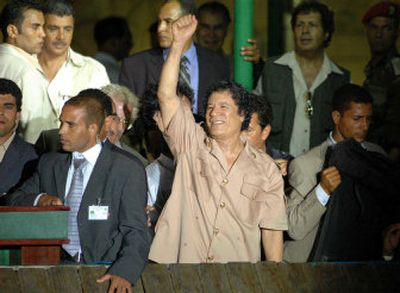Gadhafi low-key ally in fighting terrorism

LONDON – As it struggles to combat Islamic terrorist networks, the Bush administration quietly has built an intelligence alliance with Libyan leader Moammar Gadhafi, a one-time bitter enemy the United States had tried for years to isolate, topple or kill.
Gadhafi has helped the United States pursue al-Qaida’s North African network by turning radicals over to neighboring pro-Western regimes. He also has provided information to the CIA on Libyan nationals with alleged ties to international terrorism.
In turn, the United States has handed over to Tripoli some anti-Gadhafi Libyans captured in its campaign against terrorism. And Gadhafi’s agents have been allowed into the Guantanamo Bay detention camp in Cuba to interrogate Libyans held there.
The rapprochement is partially the result of a decade of efforts by Gadhafi to improve relations with the United States and end international sanctions imposed on Libya for bombing Pan Am Flight 103 over Lockerbie, Scotland, in 1988. But it also reflects the fact that Libya and the United States regard Islamic extremism as a common enemy. Even though he long supported radical causes, Gadhafi views religious militants as a menace to his secular regime.
“Their assistance has been genuine, if motivated in large measure by self-preservation,” Bruce Hoffman, director of counterterrorism and counterinsurgency studies at Rand Corp., said of the Libyans. “You have to give Gadhafi credit for recognizing the existential threat posed to his rule and revolution by (Osama) bin Laden and al-Qaida.”
Critics charge that the partnership with Libya, like those with regimes such as Sudan, Uzbekistan and Egypt, illustrates how Washington is allowing its war on terrorism to trump its effort to promote democracy and human rights in the Muslim world. They say that in cooperating with Gadhafi, the United States has strengthened his oil-rich regime and permitted him to crack down on political opponents, some with democratic credentials far stronger than his own.
Libyan dissidents, who for years thought they could count on American support, have been deeply disappointed by the Bush administration.
“Gadhafi was considered to be a dictator and terrorist, and Libya was a rogue regime,” said Ashur Shamis, a prominent London-based Libyan exile and longtime proponent of democratic reform. “Suddenly, everything has changed.”
“The Americans no longer want to see Gadhafi’s regime destabilized,” he said. “Opponents have written off the possibility of receiving tangible political support from the United States.”
The intelligence partnership between the United States and Libya has unfolded mostly in private, but both sides have publicly acknowledged its existence. In an accord reached this year, the CIA agreed to offer counterterrorism training to Libyan security personnel, two U.S. government sources familiar with the deal told the Los Angeles Times.